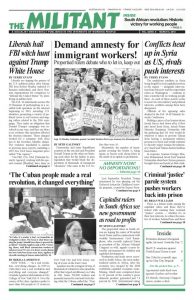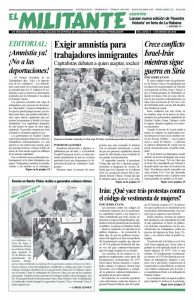SYDNEY — Tens of thousands of people, overwhelmingly youth, protested around the country Jan. 26 in the largest demonstrations in support of Aboriginal rights in decades. The actions were called to counter the rulers’ patriotic Australia Day holiday.
Aboriginal people view the anniversary of the founding of the original British penal settlement at Sydney Cove in 1788 as Invasion Day, making it a focal point for anger over oppressive social conditions indigenous people continue to face. This undermines the moral legitimacy and so-called “national cohesion” the capitalist rulers crave as they face a deepening political and moral crisis.
Aboriginal youth and elders here led off a march of up to 20,000 from The Block — a traditional inner-city Aboriginal district — to the nearby Yabun concert celebrating indigenous culture and music.
Another Aboriginal rights rally here drew 1,000. Backed by Labor Party and union officials, some Aboriginal leaders called for a treaty between the government and Australia’s First Peoples, similar to those reached between native peoples and other colonial-settler imperialist governments in New Zealand and Canada.
They marched to the building in central Sydney where a Day of Mourning congress was held in 1938, the first national Aboriginal civil rights protest.
The marches were awash with red, black and yellow, the colors of the Aboriginal flag. Chanting “No pride in genocide!” and “Always was, always will be, Aboriginal land!” protesters pointed to the decimation of the indigenous population by massacres, disease and being driven off their ancestral tribal lands.
Largest such protests since 1970s
Thousands in other cities around the country joined similar protests. By far the biggest was in Melbourne, where some 60,000 took to the streets. “I haven’t seen a crowd like this since the 1970s, the heyday of the Aboriginal political movement,” Gary Foley, a longtime Black activist and now a history professor, told the rally.
The Australian rulers’ celebration “is essentially about colonization, death, murder, and rape,” Aboriginal activist Adrian Burragubba told the Sydney rally. Burragubba is the leader of a campaign by traditional Aboriginal landowners to block the huge Adani coal mine development in Queensland.
Ken Canning from Fighting in Resistance Equally, who chaired the Sydney rally, drew attention to Black deaths in detention. “We have the highest deaths in custody rates in the world per head of population, the highest imprisonment rates,” he said.
“Too many cops, never any justice!” marchers chanted as they kicked off the demonstration here. Other banners denounced federal government police intervention in the affairs of remote Northern Territory Aboriginal communities.
The protest was to highlight the “fight for the right to our land, our culture, our language, our people, our laws,” Sue-Ellen Tighe, founder of Grandmothers Against Removals, told the Sydney rally. “In 2018 we should not be the marginalized race in the nation. We are the First Peoples.”
Some placards called for the Australian government to “change the date” of Australia Day, reflecting a growing debate in politics and the media here. Some Greens, Labor and Black representatives to Parliament seek to deflect Aboriginal protests by moving the nationalist celebration to some other, “less divisive” holiday.
In recent years, the rulers have used the celebration to talk about Australia’s growing “multiculturalism,” trying to reinforce the myth that “we are one.”
“But there is no ‘we’ in Australia’s class-divided society,” I said, speaking for the Communist League, at a Militant Labor Forum here Feb. 17. “This is what we explained to people on the march.
“The billionaire ruling families exploit and oppress the real ‘us’ — the working class and its allies, whether Aborigine or Caucasian, immigrant or native-born,” I said. “The Communist League points to the example of the socialist revolution in Cuba, where workers and farmers organized to take political power and uprooted discrimination and oppression.”

